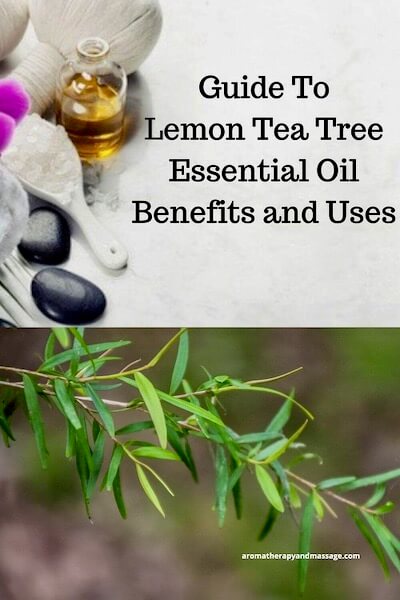Lemon tea tree essential oil (Leptospermum petersonii) comes from the same plant family as the more commonly used tea tree essential oil (Melaleuca alternifolia). Because the lemon-scented oil has a less medicinal aroma than Melaleuca, some people prefer lemon tea tree for aromatic use.
Plant family: Myrtaceae
Production: Steam distilled from the leaves of the plant, which is a shrub to small tree cultivated on the east coast of Australia.
Aroma: Intensely lemon and citrus-like.
Perfume/Aromatic note: Top
Is lemon tea tree safe to use during pregnancy? Consult a professional.
Is lemon tea tree essential oil safe for children? Do not use with children under age 2.
Cautions: This essential oil may irritate sensitive skin or cause skin sensitization. Do not use the oil on hypersensitive, diseased, or damaged skin.
Main components:
- geranial 45.4%
- neral 31.3%
- alpha-pinene 12.3%
- citronellal 6.8%
Source: Essential Oil Safety, 2nd Edition
Lemon Tea Tree Aromatherapy Benefits
Aromaweb: Emotionally, lemon tea tree uplifts and stimulates. In low concentration, the oil can both help calm fragile nerves and relieve anxiety. Other uses include stress reduction, household cleaning, odor reduction, and insect repellent.
The Complete Guide to Aromatherapy, Third Edition, Vol. 1: Diffuse lemon tea tree to purify the air, clear spaces, or aid concentration. Suggested oils to blend with lemon-scented tea tree:
- To relieve colds or flu: eucalyptus dives, 1,8-cineole-rich eucalyptus, kunzea, or tea tree.
- To create an insect repellent: citronella, niaouli, spike lavender, or peppermint.
Tisserand Aromatherapy: Lemon tea tree is uplifting, mood enhancing, and positivity inducing. The natural cleansing benefits of this oil are excellent in DIY skin-care products and also in natural cleaning products. For a body massage oil, you can blend up to 5 drops essential oil in 2 teaspoons of carrier oil. For facial use, use no more than 1 drop in 1 teaspoon carrier oil.
From Ron Guba. “Lemon Tea Tree.” Essential News, Vol. 2, 2000:
- Use lemon tea tree to help relieve headaches and sore muscles or in aromatherapy blends for dealing with cellulite.
- Low concentrations (less than 0.5%) of the essential oil have calming and sedative effects that may help alleviate insomnia, mild depression, and other stress-related conditions. Higher concentrations are more uplifting, and energizing.
- The oil also acts as a digestive stimulant, indicated for indigestion, poor appetite, nervous stomach, or nausea.
- As an insect repellent, a 20% solution of lemon tea tree was found effective against the mosquito Anopheles farauti for up to four hours. This repellent effect also may be useful against fleas.
From Aromatherapy Thymes, “A Look at Tea Tree Lemon” (Spring 2016, p. 37):
Lemon
tea tree has calming and balancing effects on the psyche and nervous
system. Suggested essential oils to blend with lemon tea tree:
- To create a profound sense of calm: petitgrain mandarin
- To balance high and low moods caused by hormones: clary sage
- To rid yourself of negative energy: fragonia
- To uplift and help relieve mental fatigue: kunzea
Lemon Tea Tree Essential Oil Uses and Blends
Window Cleaner
Use this spray within one week blending.
- 2 tablespoons white vinegar
- 10 drops lemon tea tree essential oil
- 10 drops juniper berry essential oil
- 1/3 cup distilled water
- Blend vinegar and essential oils in a glass spray bottle. Let sit for an hour..
- Add distilled water. Shake thoroughly.
- Spray windows and wipe clean.
Repel Garden Pests
Add ingredients to a glass spray bottle. Shake vigorously and spray onto garden plants. Shelf life of blend is one week.
Source: Eden’s Garden
Clean Air Blend
- 1/2 cup distilled water
- 10 drops lemon tea tree
- 10 drops tea tree essential oil
- 4 drops lemon essential oil
Mix essential oils and water in a spray bottle. (Add solubilizer, if desired, to help disperse oils in the water.) Shake vigorously and mist rooms.
Photo Credit: Krzysztof Golik, CC BY-SA 4.0, via Wikimedia Commons
